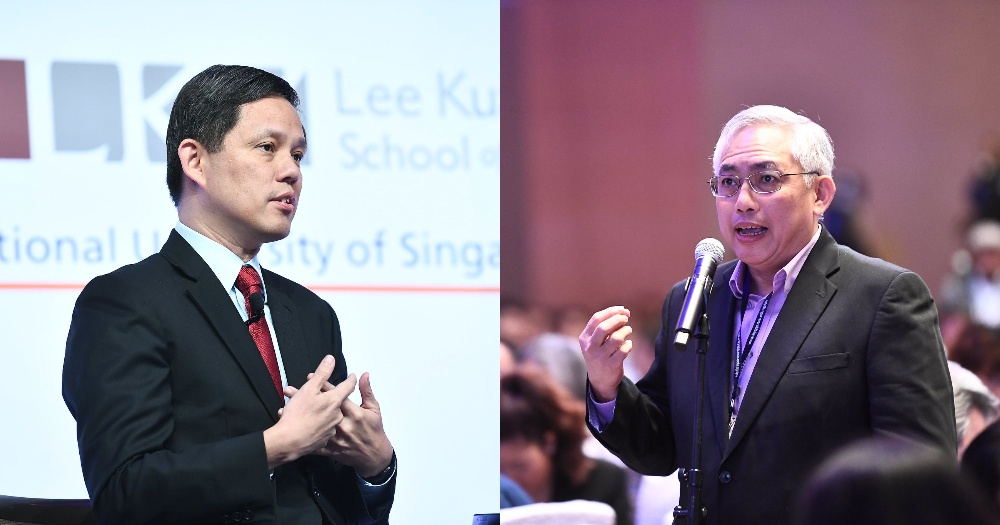Can the Singapore government share more of its vast stores of data with the public so that academics and other researchers can participate more actively in policymaking discussions?
Responding to this question from People's Power Party chief Goh Meng Seng on Monday (Jan. 20), Minister for Trade and Industry Chan Chun Sing said the issue goes beyond just data sharing, and the provision of more data is "necessary but insufficient".
He said in sessions that he conducts discussing governance and policy issues, we should not politicise them but look at them objectively.
"Don't politicise issues, understand what are the challenges, what are the options, know the difficult choices that we have to make, make the choices and most importantly, go out and carry it on the ground."
But, he said, the issue of sharing data goes beyond data sharing, and that it is "not the panacea to everything".
What type of data should the government share, for instance? Chan said if they share raw data, significant amounts of work are needed to make sense of them, but if the government provides its conclusions from the data it has gathered, "then you might be suspicious as to how we draw the conclusion".
The minister made a couple of points regarding this:
1) All of us have a responsibility to check our confirmation biases.
Chan argued that beyond the provision of data, those analysing it must first be wary of preconceived ideas of what conclusions could be drawn from it, lest they influence how the data is interpreted.
"We can have a lot of data, but... if we go in with preconceived ideas of what the data should tell us, and we have a confirmation bias, we will go and interpret it in a way that is... in fact, recently we have a very simple case whereby the data was available but the people choose to truncate the graph, scrunch the thing and then come up with a different conclusion.
Entirely possible — which is why some people don't respect the statistician very much. And it always pains me to hear when people laugh at the statistician and say that what he says is 'lies, lies and damned lies' statistics — that type of thing, like that. Now it pains me because... I'm trained to do statistics and econometrics.
So it's not just about data. So data is necessary, but we also need to have an enquiring mind and be open to ask what the data tells us and how to interpret this."
2) It's important to be open to multiple interpretations of the same set of data.
Chan gave a recent example of figures he provided at a recent Economic Development Board (EDB) review media briefing that showed 17 per cent of new jobs created between 2015 and 2018 went to permanent residents (PRs), higher than their 15 per cent overall share of the workforce.
"There were a lot of people saying, okay, why is the employment outcome of the PRs slightly better than the citizens? Now if your hypothesis is Singapore government doesn't care about the citizens, then you will say 'yeah see I show you, see, the data says the employment outcomes of the PRs is slightly better than the Singaporeans.'
Now that would be one interpretation. But surely that is not the only interpretation. The other interpretation is, actually we have pre-selected the PRs. if the PRs were all unemployed it'll be very difficult to get a PR unless they have very strong family ties here.
So you can have the same data but all I'm posturing is that unless we go in with no preconceived ideas and learn to interpret this, having data alone is insufficient."
3) No matter how much data is shared, what matters is the trust people have in the government
Ultimately, though, Chan argued that from his personal experience, "if people don't trust you as a person you can give as much data as you want and you will not win over the hearts and minds of the person".
He said the provision of more data does help, but when going out to the public to confront issues pertinent to the public and policymaking, Chan said the public's trust is important for them to have meaningful discussions.
"I don't have to reveal all the data to the second decimal point for us to have a discussion. But we have a frame, and even from open sources we are able to deduce what are the choices and options that we have. Right?"
Concluding, he said data sharing is "necessary but insufficient", because data alone does not convince people of the policy choices before them.
"It is also about the trust that our people have with us. Without that trust, nothing will work very much... at the end of the day, how do you win the hearts and minds of the people has to go beyond data.
You look back at our first and second generation of leaders. I don't think it was just data that won them over but it was because of what they say, what they deliver that earns the trust and therefore people go along with them. And it's not just data."
Read more stories from the 2020 IPS Perspectives conference:
Top photos by Jackie Ho, for the Institute of Policy Studies, NUS
If you like what you read, follow us on Facebook, Instagram, Twitter and Telegram to get the latest updates.
